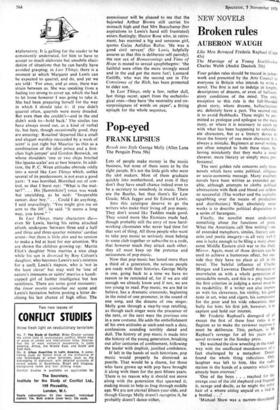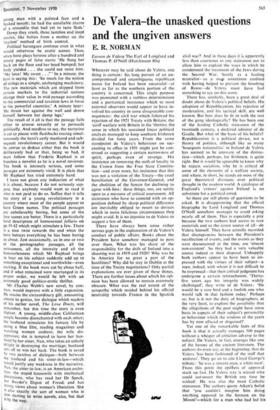NEW NOVELS
Broken rules
AUBERON WAUGH
Like Men Betrayed Frederic Raphael (Cape 45s)
The Marriage of a Young Stockbroker Charles Webb (Andr6 Deutsch 30s)
Four golden rules should be traced in poker. work and presented by the Arts Council to
everyone in Britain who intends to write a novel. The first is not to indulge in lengthy descriptions of dreams, or even of hallucin- atory conditions of the mind. The only exception to this rule is the full-blooded
ghost story, where dreams, hallucinations
etc. definitely have a part. The second rule is to avoid flashbacks. These might be per- mitted as prologue and epilogue to the main
story, or where it is necessary to catch up with what has been happening to subordin- ate characters, but as a literary device to trace the history of one main character it is always a mistake. Beginners at novel writing are often tempted to both these vices, be- lieving mistakenly that they make a novel cleverer, more literary or simply more pro- fessional.
The next golden rule concerns only those novels which have some political, religious or socio-economic message. Many excellent novels have been written as extended par- able, although attempts to clothe political abstractions with flesh and blood are seldom so successful. (The worker and the capitalist squabbling over the means of production and distribution.) What absolutely never works is to describe political disputation in a series of harangues.
Finally, the novelist must understand something about the functions of prose. What the Americans call 'fine writing'—use of extended metaphors, similes, literary con- ceits and poetic imagery—is all very well if one is lucky enough to be filing a story about some Middle Eastern civil war to the Daily Mirror. Again, most of these devices can be used to achieve a humorous effect, but out- side that they have no place at all in the novel. The baleful influence of Charles Morgan and Lawrence Durrell threatens to overwhelm us with a whole generation of unreadable novels, and this is a pity because the first criterion in judging a novel must be its readability. If a writer can also impress us with his cleverness, his virility, his good taste in art, wine and cigars, his compassion for the poor and his wide education, then bully for him; his first job, however, is to capture and hold our interest. Mr Frederic Raphael's disregard of all except the first of these four rules is so flagrant as to make the reviewer suppose it must be deliberate. This, perhaps, is Mr Raphael's revenge for all his years as a novel reviewer in the Sunday press. 'He watched the slow wrestling in the road- way with the unaffected mundaneness of a fact challenged by a metaphor. Dmitri found the whole thing ridiculous. Only laughter was left to him, like the radio station in the hands of a country which has already been overrun.' 'One of the boys . . . reached for the orange coat of the old shepherd and fingered it, savage and docile, as he might the pubic hair of a whore sitting unpaid on a bed in a brothel . . :
'Michael Shaw was a narrow-shouldered young man with a pointed face and a beaked mouth; he had the unreliable charm
of a crocodile that had yet to taste flesh.' Down they crash, these tasteless and inept similes; like babies from a mother on the 'rhythm' method of birth control.
Political harangues continue even in what would otherwise be erotic scenes. Thus, when hero plays heroine after a hundred and ninety pages of false starts: 'He flung her back on the floor and her head bumped; her body yielded . . . she could not resist him.
"My love! My sweet . . ." ' In a minute, the hero is saying this: 'So much for the notion of strings as a simple, unchanging machinery.
The raw materials which are shipped from certain markets to the industrial nations change their value in mid-passage according to the commercial and taxation laws in force in the powerful countries.' A minute later: 'He thrust her against the wall and drove himself between her damp legs.'
The result of it all is that the passage fails either to arouse sexually or to persuade politically. And needless to say, the narrative is cut to pieces with flashbacks tracing simul-. taneously the hero's early manhood and sub- sequent revolutionary career. But it would be untrue to deduce either that the book is deliberately bad or that, being so bad, it must follow that Frederic Raphael is as hopeless a novelist as he is a novel reviewer. The book is intensely serious, and some passages are extremely vivid. It is plain that Mr Raphael has tried extremely hard.
I have not given any indication of what it is about, because I do not seriously sup- pose that anybody would want to read it who is not paid to do so. Suffice that it tells the story of a young revolutionary in a country where most of the people appear to have Green names. The political passages are unbelievably boring, but some of the love scenes are better. There is a particularly lurid description of homosexual fellatio on pp 39-42 which might stimulate a few. There is a nice twist towards the end when the hero betrays everything he has been boring us about. Just occasionally, as in one or two of the pornographic passages, all the seriousness, all the intensity and all the humourlessness which Mr Raphael brings to bear on his subject suddenly add up to something exceptional and worthwhile—even exciting. If the book were cut by about half, and if what remained were rearranged in its proper order, we would be left with -an extremely good politico-erotic thriller.
Mr Charles Webb's new novel, by con- trast, would improve with a little expansion. He retains the extraordinary gift, amounting almost to genius, for dialogue which readers of his earlier novel, The Love Duets, will remember, but this time the story is even Slighter. A young, middle-class Californian couple become disenchanted with each other; the husband stimulates his fantasy life by seeing a blue film, reading magazines and watching women undress; the wife dis- approves; she is tempted to leave her hus- band by her sister, Nan, who takes an unholy delight in destroying the marriage; husband sets off to win her back. The book is saved
by two patches of dialogue—both between the husband and his sister-in-law—which
would justify any weakness in the narrative. Nan, the sister-in-law, is an American arche- type: the stupid housewife with intellectual Pretensions, who has read her Dr Spock,
her Reader's Digest of Freud, and has strong views about women's liberation. She is also exactly the sort of woman who is now starting to write novels, alas, but that is by the way.























































 Previous page
Previous page